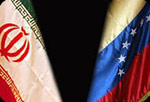 Miami Herald: Latin America rarely comes up as a major issue in U.S. presidential races, but this time it will: there are growing signs that Iran’s rising presence in the region will become a contentious election topic. The Miami Herald
Miami Herald: Latin America rarely comes up as a major issue in U.S. presidential races, but this time it will: there are growing signs that Iran’s rising presence in the region will become a contentious election topic. The Miami Herald
By Andres Oppenheimer
 Latin America rarely comes up as a major issue in U.S. presidential races, but this time it will: there are growing signs that Iran’s rising presence in the region will become a contentious election topic.
Latin America rarely comes up as a major issue in U.S. presidential races, but this time it will: there are growing signs that Iran’s rising presence in the region will become a contentious election topic.
Republican hopeful Mitt Romney and leading Republicans in Congress are stepping up their attacks on President Obama for allegedly not doing enough to stop what they see as Iran’s intention to use Latin America as a launching pad for terrorist attacks against the United States.
The issue is drawing growing attention in Washington. On Feb. 2, as Iran launched its own region-wide Spanish-language TV network in Latin America — a follow-up to President Mahmoud Ahmadinejad’s fifth visit to the region in as many years, the Republican-controlled House Foreign Relations Committee held hearings about “Iran’s agenda in the Western Hemisphere.”
The hearings came hours after U.S. National Intelligence chief James Clapper stated that Iranian officials “are now willing to conduct an attack in the United States.” Clapper did not explicitly suggest that such attacks would come from Latin America, but Republican congressional leaders did.
House Foreign Affairs Committee’s Chairman Ileana Ros Lehtinen, R-Miami, said in her opening statement that Iran’s alliance with Venezuela, Nicaragua, Cuba and Ecuador “can pose an immediate threat by giving Iran a platform in the region to carry out attacks against the United States, our interests, and allies.”
Recalling last year’s U.S. government disclosure of a plot by Iran’s Quds Force to kill the Saudi Ambassador on U.S. soil, and a reported 2007 scheme by an Iranian diplomat in Mexico to launch a cyber-attack against the United States, Ros Lehtinen added that “the fact that the military arm of a state-sponsor of terrorism has its operatives in multiple countries in our hemisphere is certainly case for alarm.”
In his testimony to the committee, University of Miami researcher Jose Azel warned of a nightmare scenario in which Iran could place nuclear weapons aimed toward U.S. territory in Venezuela — much like the Soviet Union began to build nuclear bases in Cuba during the 1962 missile crisis .
Norman A. Bailey, a former Reagan administration official, said Venezuela is helping Iran circumvent international financial sanctions through the use of the Venezuelan financial system.
In addition, hard-liners stress that Iran-backed terrorist groups such as Hezbollah are likely to use friendly countries in Latin America as bases from which to prepare terrorist attacks elsewhere in the region. Argentina has charged that Hezbollah, with Iran’s assistance, carried out the deadly bombings against the Israeli Embassy and a Jewish community center in Buenos Aires in 1992 and 1994.
Romney has lashed out against Obama for allegedly failing to respond to Ahmadinejad’s ties to Venezuelan President Hugo Chávez, and in a Nov. 22 Republican debate, he warned that Hezbollah’s activities “throughout Latin America” pose “a very significant and imminent threat” to the United States.
The Obama administration says it is watching Iran’s activities in the region closely, and warns against a U.S. over-reaction to unconfirmed reports about Iran’s activities there. Remember the weapons of mass destruction fiasco that led to the U.S. invasion of Iraq, officials say.
Furthermore, a senior State Department official told me that Ahmadinejad is increasingly weak at home and isolated internationally, and may be exaggerating the importance of his ties with Latin America “out of desperation” to show his people at home that he has not become an international pariah.
My opinion: There may be a lot of political theater behind Iran’s Latin American agenda. But the conflict over Iran’s nuclear program could lead to the biggest international crisis in the Western Hemisphere in recent decades if — as many in Washington fear — Israel launches a pre-emptive attack on Iran’s nuclear facilities, and Iran retaliates by striking against civilian U.S. or Israeli targets in Latin America, as it did in Argentina two decades ago.
Hard-liners in Washington would be quick to see a Venezuelan link. And Venezuela’s narcissist-Leninist leader would be delighted to be at the world’s center stage and would call for Latin American “solidarity” against potential U.S. sanctions. It would be a big continental mess.
U.S. presidential hopefuls should keep a cool head, and — barring this scary scenario — leave Latin America out of the Iran crisis. They should not contribute to some Latin American autocrats’ efforts to drag all of Latin America into the world’s most dangerous conflict.


